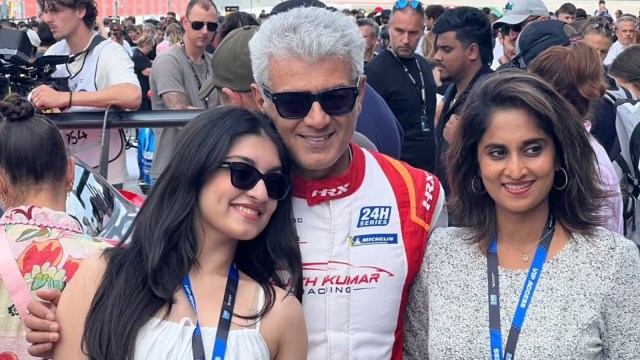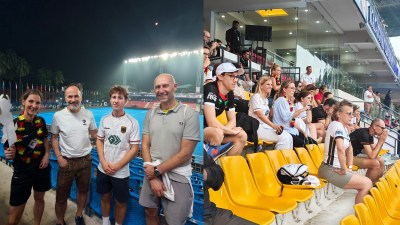📣 For more lifestyle news, click here to join our WhatsApp Channel and also follow us on Instagram
‘I miss them as much as they miss me’: Ajith Kumar on pursuing racing while being away from his children; ways to create balance
He also reflected on his parenting approach, noting, “My son loves it too – he’s started go-karting, but not on a serious level yet.”
 Ajith Kumar says his wife Shalini has been keeping the household running smoothly (Source: Instagram/Ajith Kumar)
Ajith Kumar says his wife Shalini has been keeping the household running smoothly (Source: Instagram/Ajith Kumar)Tamil actor-racer Ajith Kumar recently opened up about his experience pursuing motosports while managing family responsibilities. In an interview with India Today, he acknowledged the sacrifices involved and credited his wife, Shalini, for keeping the household running smoothly.
Ajith said, “There are so many things that Shalini is handling. If not for her support, I wouldn’t be able to do all this. Looking after the home, the children, when I am away — it is not just a sacrifice on my side. The children hardly get to see me, and I miss them as much as they miss me. These are the things that are never seen or understood. But when you love something so dearly, you have to make your sacrifices.”
He also reflected on his parenting approach, noting, “My son loves it too – he’s started go-karting, but not on a serious level yet. I’ll give him time to decide if he really wants to pursue it. Be it films or racing, I would not want to force my views on them. I want them to come on their own and support them in every way possible.”
So, what are the potential emotional and psychological effects on children when a parent is frequently away due to career commitments?
Psychotherapist Sakshi Mandhyan tells indianexpress.com, “When a parent is often away, children may feel a gap in closeness and sometimes wonder if the parent is truly available to them. In my work, I describe this as attachment strain, where physical absence begins to be felt as emotional absence. If it continues for long periods, it can create insecurity or sadness.”
She adds that what matters most is not the number of hours spent together but the quality of the connection. “Families I work with often find that simple rituals make a big difference: a predictable video call at bedtime, a handwritten note in a lunchbox, or a set time each week reserved just for the children. These small but reliable gestures build emotional security and remind children that they are deeply loved, even when a parent is physically away,” mentions Mandhyan.
View this post on Instagram
Importance of spousal or co-parent support in maintaining family balance
When one parent is heavily pulled into work or a passion, Mandhyan states, the other naturally takes on the role of an anchor at home. “In my practice, this is referred to as a co-parenting alliance, where parents back each other and share responsibility even if their roles look very different. For children, this alliance provides them continuity of care — meals happen on time, routines stay intact, and someone is emotionally present when needed.”
For the parent who is away, she says that knowing their partner is managing well at home “reduces guilt and allows them to reconnect more positively when they return.” When both parents openly respect and acknowledge each other’s contributions, it not only strengthens the marriage but also models cooperation and balance for the children.
Encouraging autonomy and self-driven interests in children while managing the pressures of a busy lifestyle
Encouraging autonomy is central to what we call self-determination theory, Mandhyan explains, the idea that children prosper when their choices are respected. “Even in busy families, parents can nurture this by asking open-ended questions, listening carefully, and supporting exploration without rushing decisions. Instead of directing every step, parents act as facilitators by providing exposure and resources while leaving space for the child’s own choices,” concludes the expert.
📣 For more lifestyle news, click here to join our WhatsApp Channel and also follow us on Instagram
- 01
- 02
- 03
- 04
- 05



























